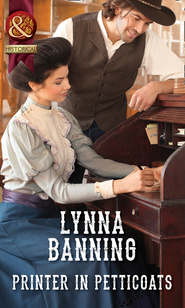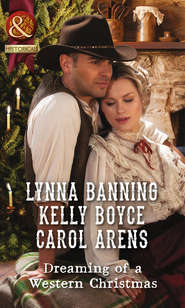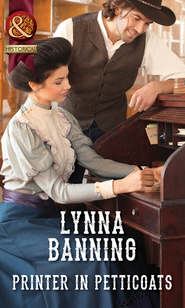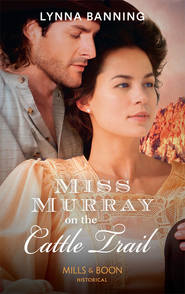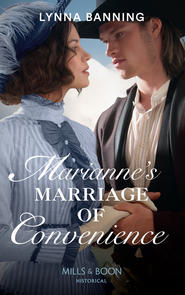По всем вопросам обращайтесь на: info@litportal.ru
(©) 2003-2025.
✖
Wildwood
Настройки чтения
Размер шрифта
Высота строк
Поля
Jeremiah hesitated. “Got her daddy’s eyes. Kinda hard and shifty-like sometimes. Got her momma’s nose and mouth, though. Guess she’ll be all right when she grows up some.”
Jessamyn laughed out loud. “Jeremiah, maybe you just don’t like children?”
“Mr. Ben grew up fine, he did,” Jeremiah countered. “Handsomest man I ever did see, even when we was young’uns. His eyes were different from Mr. Carleton’s, even then. ‘Course, they’re sadder now, since the war an’ all.”
Jessamyn came to instant attention. She needed some background on Ben Kearney for the newspaper article she planned to write. Here, standing before her, was a walking, talking firsthand source.
“What about the war, Jeremiah? Tell me about it—about you and the sheriff, I mean. About your experiences.” She bit into her second drumstick and waited as Jeremiah cleared his throat.
The town lay dark and quiet by the time Ben rode in past the livery stable. Crickets sang, their strident voices carrying over the occasional cry of a coyote. Heat rose from the dusty roadbed, the rich smell of honeysuckle and tobacco smoke drifting on the warm night air.
Ben slowed the horse to a walk. Nights like these made his groin ache. He wanted to yell or break something to ease the tension curling inside.
He needed a woman.
He’d settle for whiskey.
The Dixon House hotel and Charlie’s Red Fox glowed like Mississippi paddle-wheelers. The sheriffs office was dark. Jeremiah must be out keeping an eye on things.
He dismounted, tossed the reins over the hitching rail and pushed open the door to his office. Touching a match to the lamp wick, he watched the pool of golden light settle over the cat lazing on his desk. “Move over, Shiloh.” He lifted the boneless animal off the clutter of papers.
More mail. Maybe something that would provide a clue’ to Thad Whittaker’s murder.
And maybe not. So far, he’d run into nothing but dead ends. It shouldn’t be that difficult to figure out who wanted the outspoken editor of the Wildwood Times silenced, but with each batch of new communications, Ben’s investigation turned into a bigger ball of snakes. A corrupt Bureau of Indian Affairs administrator, shady railroad investors trying to outmaneuver each other, cattle rustled from valley ranches, Indians mad enough to smoke a war pipe. Ben ran his fingers through his hair and sighed. The war’s end hadn’t brought peace to the West. Far from it.
He scratched the cat under its chin until a throaty purr rumbled, then turned his rangy frame toward the open doorway. Maybe he’d leave the mail until morning and drop by the hotel for a steak and some of Rita’s baked beans.
Across the street, light glowed inside the newspaper office. He focused on the paned front window opposite him. Then again, maybe he’d just see what Miss Starched Petticoat was up to at this hour.
He lifted his Colt from the hook behind the door, strapped the revolver low on his hip and headed for the Wildwood Times’.
Jeremiah drew in a long breath and blew it out through pursed lips. “Can’t tell you all of it ‘bout the war, Miss Jessamyn. ‘Twouldn’t be fittin’. But some of it I can.” He cocked his head to one side. “Yes’m, some of it I surely can tell you.”
Jessamyn stopped chewing and listened.
“Mr. Ben and me, we went to war together, like I said. I was his aide-de-camp. Mostly I just do for him like his manservant always done in Carolina—wash his shirts, shine up his boots, be sure he takes time to eat. He was awful busy in the war—had near two regiments to command after the other colonel got himself killed. Mr. Ben got his horse shot out from under him twice at Shiloh. Madder’n a hen caught in the creek, he was.” Jeremiah grinned at the memory.
Jessamyn resisted the impulse to reach into the desk drawer for her pencil and writing pad. Rather than interrupt Jeremiah, she’d commit the important parts to memory.
“How did he get that scar on his neck?” she prompted.
The deputy’s grin faded. “He doesn’t like to talk about it much. He took a minié ball. Tore into his chest and mangled him pretty bad up to about here.” He tapped his throat with a chicken bone.
“The surgeon didn’t fix it quite right, and it festered. Woulda been all right cept’n he was captured at Vicksburg and sent to a Northern prison. They had to cut it open to drain it and then sew him up again.”
Horrified, Jessamyn stared at the deputy. “You mean it was a Yankee doctor who—”
Jeremiah nodded. “Fought like a son of a—Oh, ‘scuse me, Miss Jessamyn. Weren’t any use, though. I saw it had to be done. Otherwise, it’d have the gangrene in it.”
Jessamyn’s appetite vanished. “Oh, how awful.”
“Yes’m, it was.”
“You were there, Jeremiah? But why? Surely you could have gone back to your home on the plantation?”
“I stayed,” Jeremiah replied quietly. “The colonel, he tried to get me to leave him when he saw the Yankee boys comin’ over the hill at Vicksburg. I wouldn’t budge, though. So, in the end they took us both.”
“Oh, Jeremiah! How courageous that was!”
The deputy flushed under his tan. “’Tweren’t no such thing, Miss Jessamyn. Ben and me been friends from the cradle, you might say. We grew up together, fishin’ and ridin’—even some schoolin’ afore his pappy sent him off to the academy. Besides, I promised Miss Lorena I’d watch out for him. A body couldn’t refuse Miss Lorena nothin’, so I stuck with him.”
“Miss Lorena?” The question slipped out before Jessamyn could stop herself.
“Good thing, too,” Jeremiah continued, purposely ignoring her query. “After the surgeon cut Ben’s chest open, he like to bled to death till I poulticed him like my momma taught me.”
Jessamyn found her hand shaking so violently she couldn’t hold her fork steady. She laid it down on the desk. “No wonder he’s so brusque,” she said half to herself. “He must hate all Northerners.”
“Oh, no, ma’am,” Jeremiah offered with a chuckle. “Not just Northerners. Part of him hates most everybody, ‘cept your pappy—Mr. Whittaker—and me. And sometimes I think he even—”
Something in the man’s raspy voice struck a nerve. Sometimes, she supposed, the sheriff acted as if he even hated his faithful companion, Jeremiah. A resonant chord of understanding tolled in her heart. She knew from her own experience how devastating it was to be abandoned. She also knew how healing it could be to find a friend.
She had nothing in common with Sheriff Ben Kearney. He was a rich Southern plantation owner, she a poor Northern working girl. Ben Kearney was a man of few words, a loner, unfathomable and unyielding as an iron strongbox. Jessamyn relished every waking moment of watching the fascinating parade of people that made up day-to-day life.
No, sir, she had nothing in common with Sheriff Ben Kearney. But she shared an unspoken bond with thoughtful, soft-spoken Jeremiah. Then and there she resolved she would be the deputy’s friend.
“Come on, Jeremiah,” Jessamyn announced. “Let’s have some of Cora’s applesauce cake, then get back to work!”
She unwrapped the square of cinnamon-scented cake, cut it in two pieces with the paring knife Cora had provided, and handed one to Jeremiah. Just as she opened her mouth to take a bite, the door banged open.
Sheriff Ben Kearney leaned his tall form against the door frame, the rowels on his spurs chinging. With slow, deliberate motions he pushed his hat up off his forehead and crossed one black boot over the other.
“Evening,” he said, his voice lazy.
The look in his hard gray-blue eyes sent Jessamyn’s heart skittering into her throat.
“Smells like a Carolina stump whiskey still in here,” the sheriff remarked, his voice ominously soft.
Jessamyn bristled. “We were—I was cleaning my printing press, Sheriff.”
“With whiskey?”
“Yes, with whiskey. The mercantile had no kerosene. Your deputy here—” She glanced toward Jeremiah and gasped. The solidly built man had vanished out the back door.
“Jeremiah came to my aid at the Red Fox,” she finished lamely.
Ben’s dark eyebrows rose. “The Red Fox,” he echoed. “A saloon is no place for a woman. Miss Whittaker. I thought I made that clear yesterday.” Flinty blue eyes bored into hers as he waited, arms folded across his chest, for her response.
“You did. But, you see, without kerosene, I had no choice but—”






